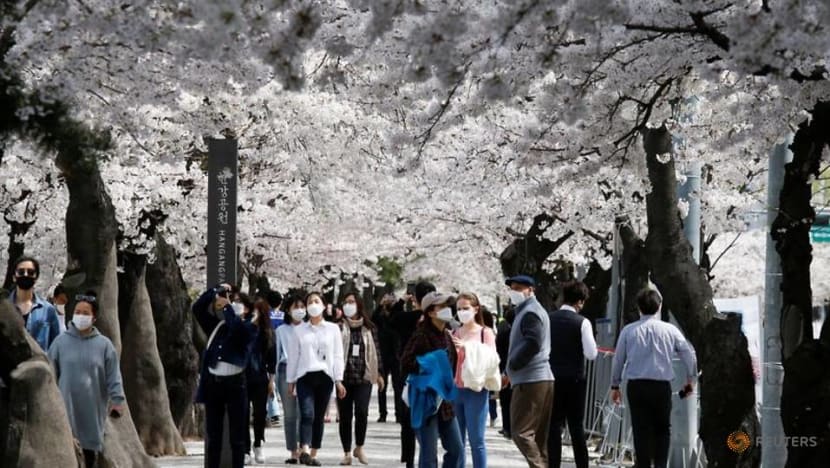South Korea widens public access to COVID-19 self-test kits amid surge in cases

FILE PHOTO: People walk near a cherry blossom street, closed to avoid the spread of the coronavirus disease (COVID-19), in Seoul, South Korea, April 1, 2021. REUTERS/Heo Ran
SEOUL: South Korea on Friday (Apr 23) granted conditional approval to allow the public to use two coronavirus self-test kits for the first time, as a surge in infections rekindled calls to step up testing.
The decision comes as South Korea grapples with a nationwide rise in cluster infections, spurring authorities to urge tougher enforcement of distancing rules to avert a fourth wave of the pandemic.
The makers of the kits, SD Biosensor and Humasis Co, were given three months to provide further clinical trial data on self-testing as a condition of the approval, the drug safety ministry said in a statement.
Although the products have been available in European countries since last year, South Korea had limited their use to medical specialists.
The kits could yield results within about 15 minutes, but with an accuracy of 90 per cent, the ministry added, versus the 98 per cent proven for industry-standard PCR tests and specialist-administered rapid tests.
"Despite the differences in accuracy, there is a need to use those kits as a supplementary tool," Acting Prime Minister Hong Nam-ki told a daily meeting on virus fighting efforts.
"If PCR tests offer microscopic examinations with almost 100 per cent accuracy, self-test kits can be compared to results made with naked eyes."
READ: How South Korea turbocharged specialty syringe production for COVID-19 vaccines
Health authorities have warned that the kits have a greater possibility of false negatives if handled by non-professionals, since a high viral load in the nasal passageways is often essential for a reliable result.
But officials have expressed positive views in recent weeks about allowing limited use, amid fears of a potential fourth wave.
Some local government chiefs have urged their use in homes, restaurants, shops and places of worship as a quick and easy way to detect possible infections.
Thursday's 797 new infections reported by the Korea Disease Control and Prevention Agency were the highest since Jan 7, when the third wave began to abate after the daily figure topped 1,200 in late December.
The nationwide tally stands at 117,458 infections, with 1,811 deaths.
BOOKMARK THIS: Our comprehensive coverage of the coronavirus outbreak and its developments
Download our app or subscribe to our Telegram channel for the latest updates on the coronavirus outbreak: https://cna.asia/telegram










